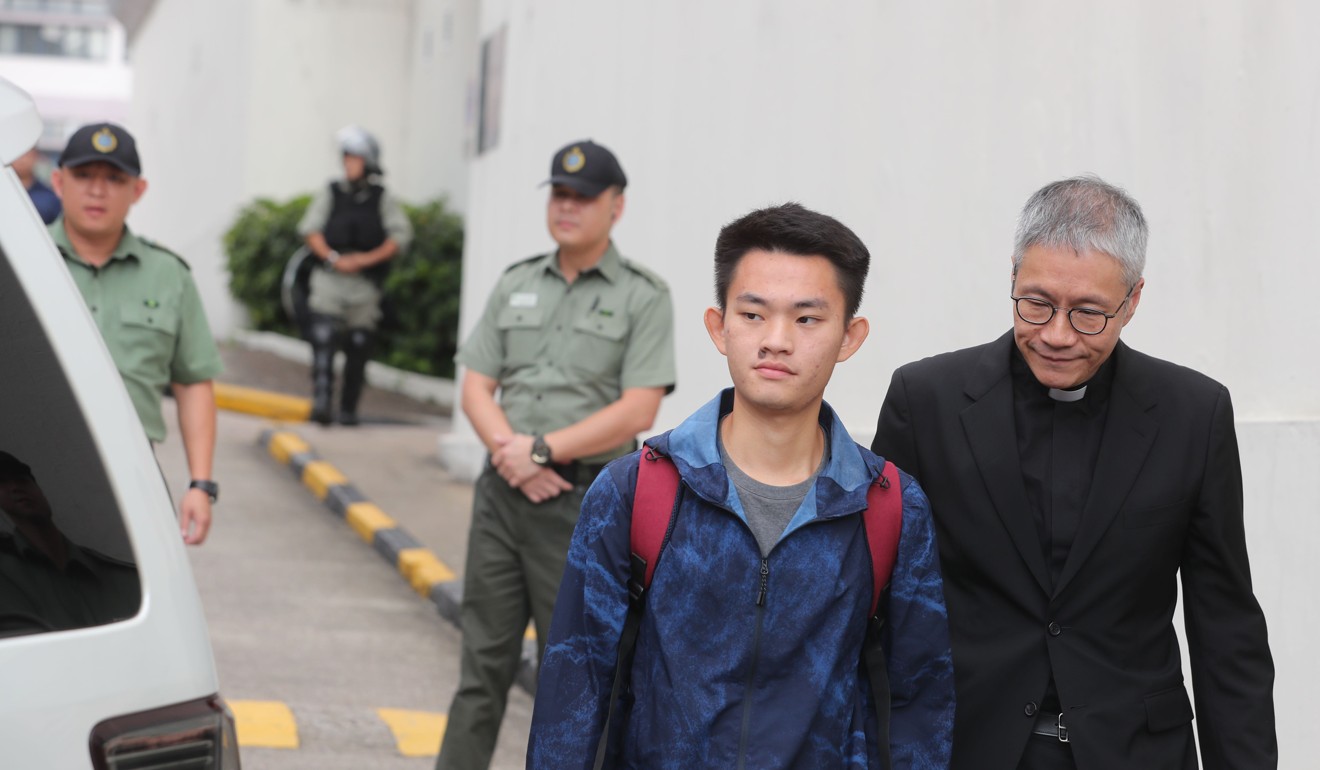
Hong Kong murder suspect at centre of extradition bill crisis begs for public forgiveness upon release from jail
- Chan Tong-kai, who says he will surrender to Taiwanese authorities, apologises on his release from Hong Kong prison, but is expected to stay in city on Wednesday
- Chan, 20, is suspected of murdering his pregnant girlfriend in Taiwan, in a case that has also set off political row with the self-ruled island

A Hong Kong murder suspect whose politically loaded case ignited the city’s extradition bill crisis begged for public forgiveness as he was released from prison on Wednesday amid an escalating row with Taiwan.
After spending 19 months in custody on money-laundering charges, Chan Tong-kai, wanted for the murder of his pregnant girlfriend in Taiwan, walked out of Pik Uk Correctional Institution in Clear Water Bay at 9am.
Reverend Canon Peter Koon Ho-ming, a top Anglican priest who had been visiting Chan weekly in jail and played a key role in persuading him to surrender to Taiwan authorities, told the Post it was unlikely the 20-year-old student would leave Hong Kong on Thursday.
Facing the media cameras outside the maximum-security prison, Chan bowed before apologising to the victim’s family and to the people of Hong Kong.
“I am willing, for my impulsive act and things I did wrong, to surrender myself to Taiwan to face sentencing,” he said.
“I hope this can give [deceased girlfriend Poon Hiu-wing’s] family some relief, and she can rest in peace.”

Thanking his parents, he said: “Even though I’ve made the worst mistake, they still care for me, support me and won’t give up on me.”
Chan begged Hongkongers for forgiveness before bowing for a second time and leaving in a white seven-seater vehicle, without taking questions from dozens of reporters waiting for him.
The vehicle Chan was travelling in with Koon was later seen entering King’s Park Hill in Yau Ma Tei. Metal barriers were in place to control traffic in and out of the housing estate.
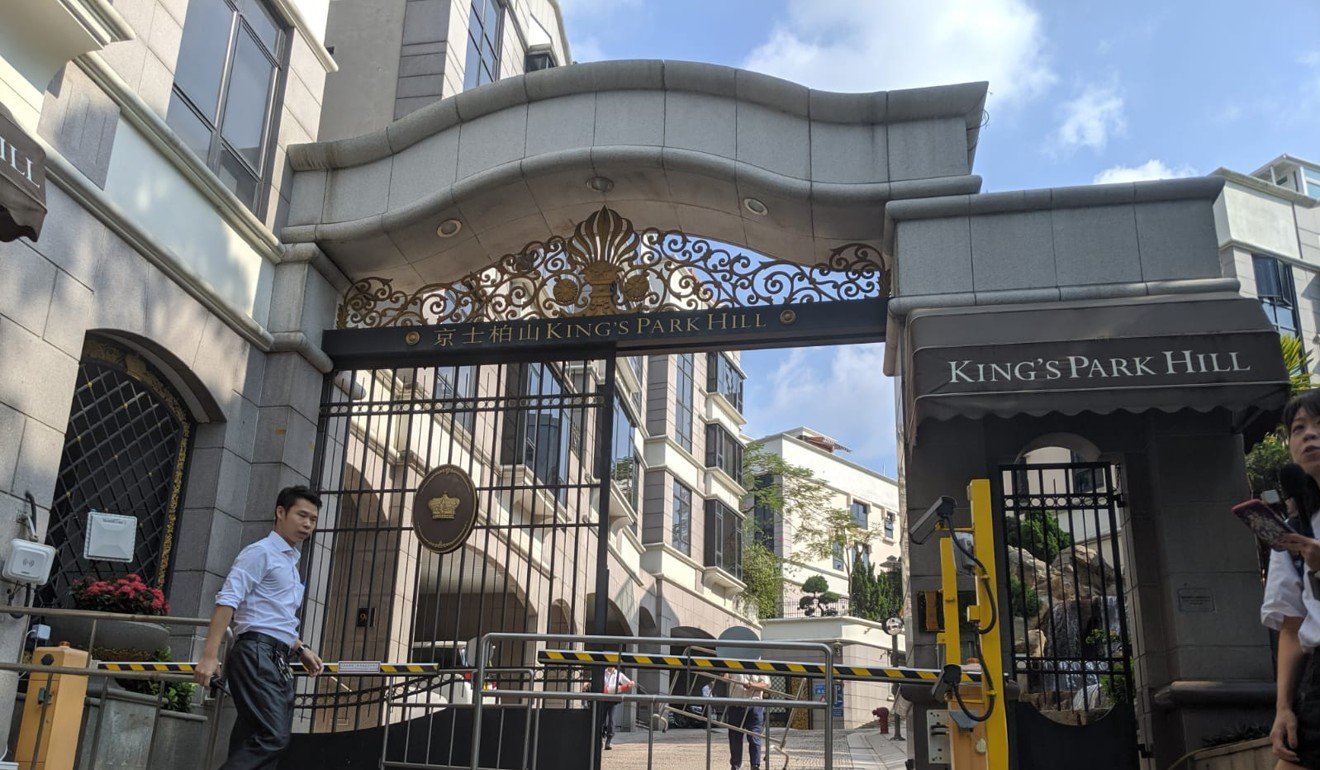
Koon then left the estate in the same vehicle without the murder suspect while Chan, under police protection he had requested, was taken to an unknown location.
His case was the trigger for the city’s biggest crisis in decades as Chief Executive Carrie Lam Cheng Yuet-ngor held it up to justify her disastrous extradition bill, arguing that it was needed to plug the legal loophole that prevented Hong Kong from sending him back to Taiwan to face justice.
Chan fled to Hong Kong after a holiday with Poon, 20, in February last year during which she was murdered.
Lacking enough evidence to try him for a killing in another jurisdiction, and unable to send him back in the absence of an extradition agreement between the two sides, Hong Kong prosecutors could only charge him for money laundering for illegally using Poon’s finances upon his return home.
Chan was sentenced to 29 months in jail, but ended up serving only six months before his release. His term was reduced by a third for good behaviour, and 13 months of detention before his sentencing was counted as time served.
The extradition bill would have allowed the transfer of criminal suspects from Hong Kong to mainland China, among other jurisdictions, sparking fears about their treatment under a different judicial system across the border, and triggering mass protests that have not died down since they began in June.
Increasingly violent and chaotic protests forced Lam to announce in September that the bill would be formally withdrawn, but the backlash had already snowballed into wider social unrest.
After first insisting that it was Hong Kong’s responsibility to rearrest Chan and try him for murder, the Taiwan government on Tuesday offered to accept his surrender, but stipulated that he should be escorted back to the self-ruled island by Taiwanese police and prosecutors who would be sent to the city to pick him up.
The Hong Kong government slammed the offer as “disrespect” for the city’s jurisdictional power and “totally unacceptable”.
With both sides accusing each other of playing politics at the cost of justice, their war of words continued following his release on Wednesday.
Taiwanese President Tsai Ing-wen said the island would not agree to his surrender in exchange for leniency.
Addressing criticism of her government’s handling of the case, she said: “Everything we are doing now is to uphold justice ... enhance our national sovereignty.”
She added her administration would “continue to request that the Hong Kong government provides judicial assistance, especially in the area of evidence gathering”.
The evidence that Taiwan is asking for, which includes the murder confession Chan made to Hong Kong police, remains a sticking point because of uncertainty as to how it will be delivered when the two sides do not have a mutual legal assistance agreement.
Reverend Canon Peter Koon Ho-ming leaves King's Park Hill without murder suspect Chan Tong-kai
Video: SCMP/Sum Lok-kei pic.twitter.com/OUJk7RmEU0— SCMP Hong Kong (@SCMPHongKong) October 23, 2019
Taiwan’s Mainland Affairs Council said in a late-night statement that the island’s police had set up a single channel to deal with Chan’s case and notified the Hong Kong government about it.
“Should the suspect Chan really want to come to Taiwan to stand trial, he can make contact through the channel for related arrangements,” the council said.
As for reports that Taiwan immigration authorities had removed Chan from its control list and he was free to board any flight to Taiwan, the council said the fugitive could travel to the island, but he was still on the list for the purpose of allowing the authorities to track his movements.
Hong Kong security minister John Lee Ka-chiu slammed Taiwan authorities for obstruction, repeatedly changing their position, and making false accusations.
“That’s why I urge the Taiwanese government to see how the accused person’s surrender would be best-facilitated, rather than laying all these hurdles and restrictions,” he said. “Taiwan should bear all the responsibility [if justice is not served].”
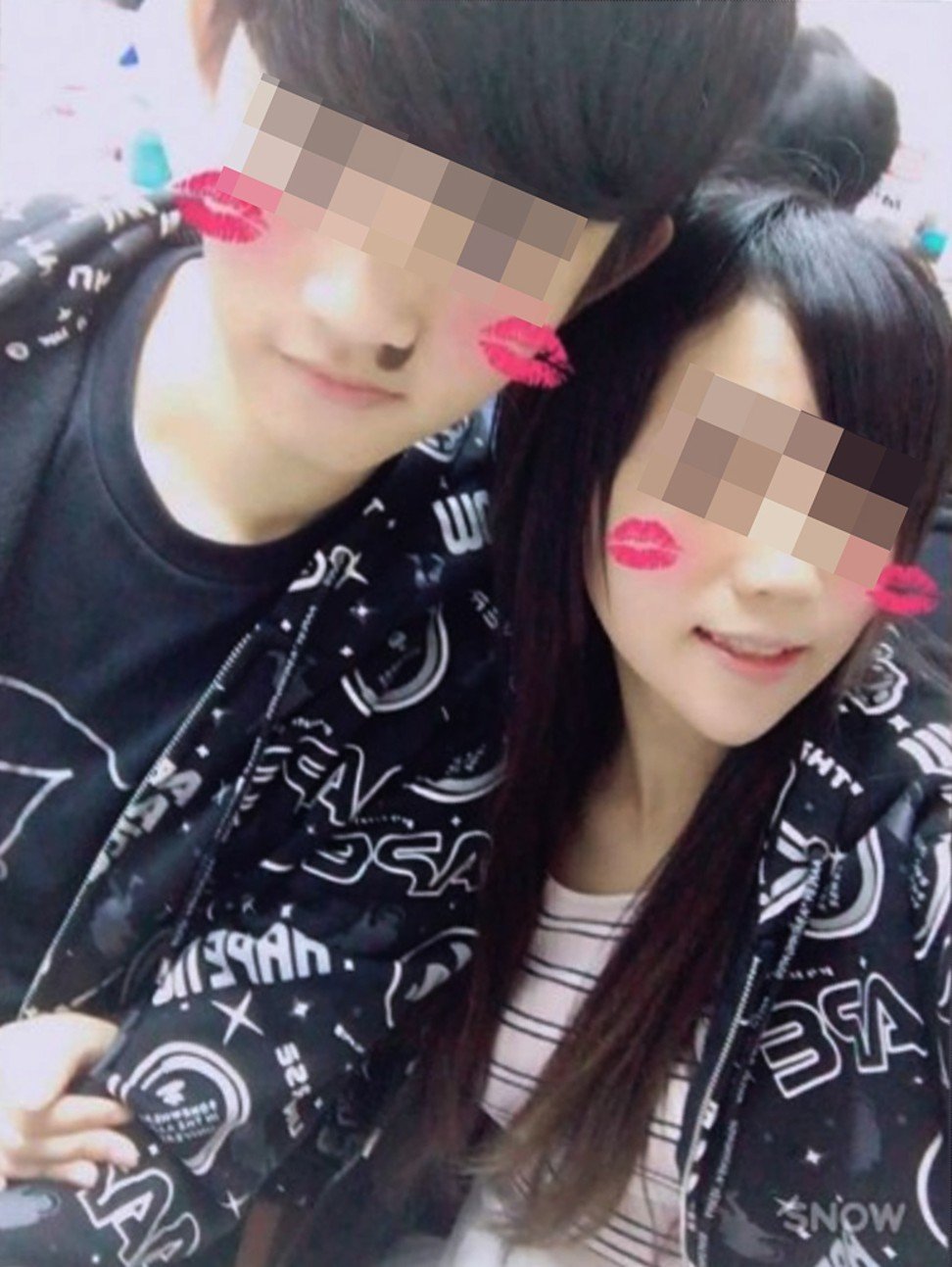
With no comment on the row from Beijing so far, Li Fei, a mainland academic and expert on Taiwan affairs said there was no need for its involvement.
“Chan has agreed to turn himself in, but Tsai Ing-wen is playing politics and not taking him,” Li said. “Of course Tsai does not want Chan back in Taiwan, because the case will then become a hot potato for her to handle as it raises questions about her election campaign that has been based on emphasising her claim of Taiwan sovereignty.”
Anglican priest Koon said he wanted to ensure Chan would be fairly treated and not turned into a political pawn.
He said Chan had originally bought his tickets for Taiwan, but cancelled them due to the uncertainty ahead.
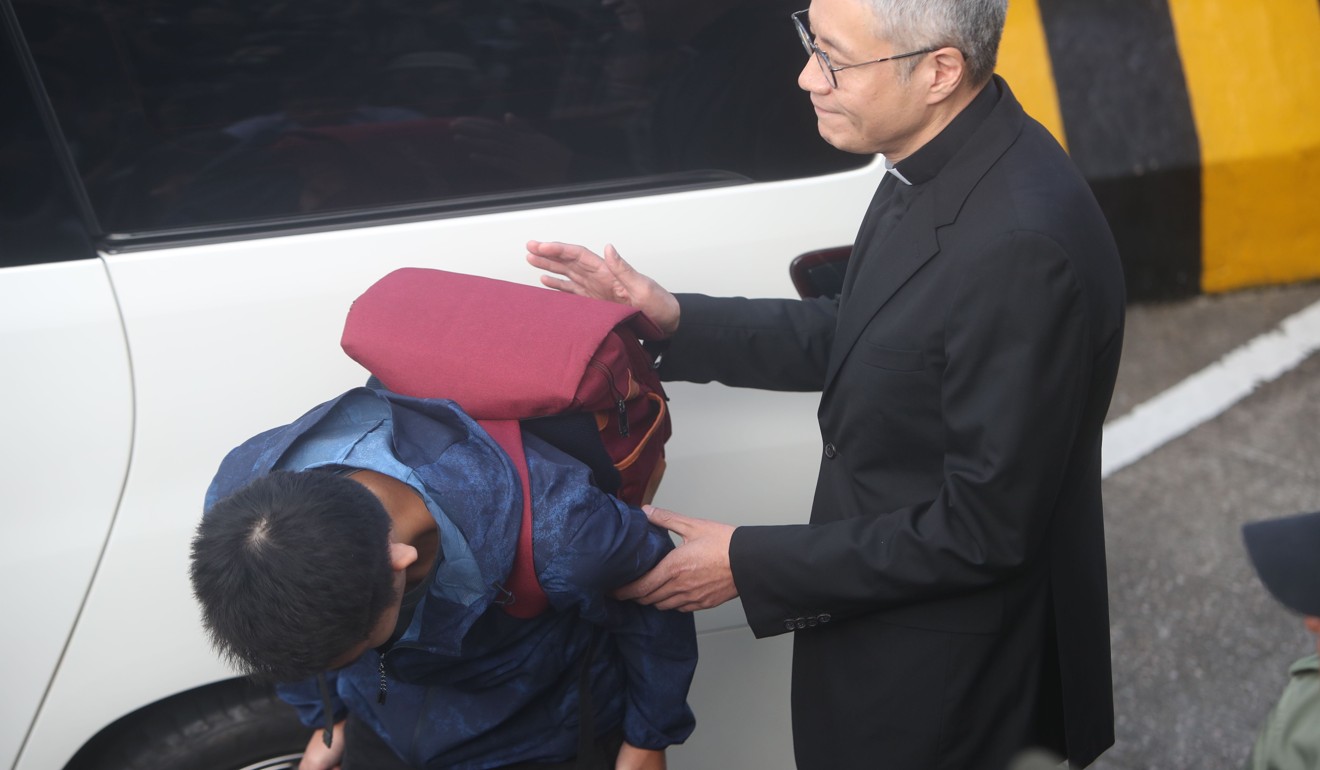
A source close to the matter said while the aim was to eventually get the suspect back to Taipei, Taiwan's wavering stance made it difficult.
The source also said Taiwan’s comments on the crime being premeditated was a “threat” to due process. “There is extreme prejudice [against Chan],” the source said.
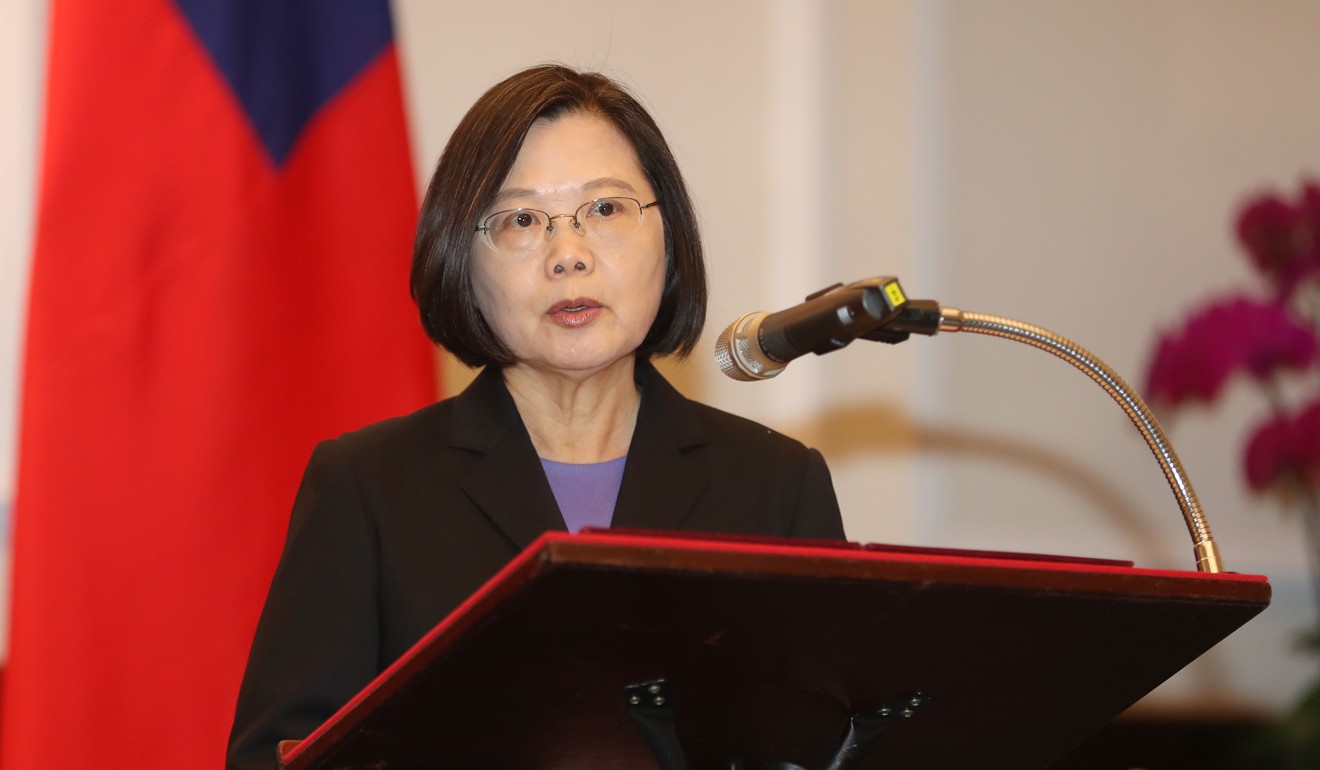
Meanwhile, Chan’s release was not expected to attract much attention from protesters, according to one anti-government activist.
“Although he is caught in the political storm, I do not sympathise with him,” the protester said.
“So far the extra damage he suffered is guilt.”
The Post visited the flat of Chan's parents on Wednesday morning in Kai Ching Estate in Kowloon. No one answered the door.
A woman living on the same floor as Chan's parents said she had seen them recently when taking out the rubbish.
“I didn't know Chan Tong-kai would be out today,” the neighbour said, declining to be named.
HOW THE POLITICAL CRISIS UNFOLDED
February 2018
Chan Tong-kai, 19, and his pregnant girlfriend Poon Hiu-wing, 20, travel to Taipei together, but Poon does not return to Hong Kong and her body is later found.
March 2018
Chan is arrested for murder by Hong Kong police but only charged with money laundering for dealing with Poon’s properties, for which he is later jailed for 29 months.
He could not be sent to Taiwan despite requests from Taipei’s authorities, since there is no formal extradition agreement between the two places.
February 2019
Security Bureau proposes a revision of the extradition regime, which would allow the transfer of fugitive to any place Hong Kong lacks an agreement with, including mainland China, Taiwan and Macau.
Chan’s case has been used by the government as the key justification to plug the loophole in the legal system.
May 20
After weeks of filibustering in the bills committee, security minister John Lee announces the bill will be tabled to full council directly on June 12.
June 9
First massive rally is held by Civil Human Rights Front, which estimates 1 million people taking to the streets to protest against the bill. But the government indicates the scrutiny will resume on June 12.
June 12
Clashes erupt after protesters besiege the Legislative Council, forcing the government to adjourn the bill’s scrutiny.
June 15 and 16
Chief Executive Carrie Lam announces the bill will be suspended. But a day later, a second massive rally is held with an estimated 2 million people taking to the streets and demanding complete withdrawal of the bill.
July 1
More than 100 protesters storm the Legislative Council building, and make electoral reform for greater democracy another key demand.
July-August
Massive protests are held across different districts in the city, some descending into violence.
September 4
Lam officially announces the extradition bill withdrawn, but it fails to stop the unrest.
October 18
Reverend Canon Peter Koon Ho-ming reveals Chan’s willingness to surrender to Taiwan after he is released on October 23. Hours later, the city leader receives a letter from Chan expressing the same wish.
October 21
Taipei says Chan’s surrender is not enough and requests formal talks within a mutual legal assistance framework. But Hong Kong’s Security Bureau asks Taipei not to cause unreasonable delay and handle the case with “common sense”.
October 22
Taipei makes surprise reversal of its earlier decision not to accept Chan from Hong Kong.
October 23
Hong Kong government rejects Taiwan’s “totally unacceptable” offer to send officials to the city to take back the murder suspect. Chan is released from Pik Uk Correctional Institution. His prison term was reduced by a third for good behaviour, and 13 months of detention before his sentencing was considered as time served.